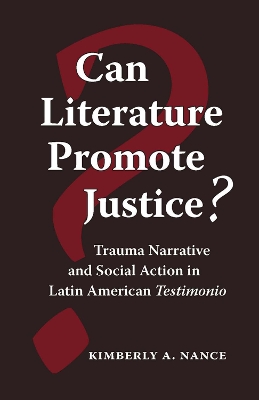As if in direct response to ""The New Yorker's"" question of ""The Power of the Pen: Does Literature Change Anything?"", Kimberly Nance takes up the relationship between ethics and literature. With the 40th anniversary of the testimonio occurring in 2006, there has never been a better time to reconsider its role in achieving social justice. The advent of the testimonio - loosely, a political autobiography of a Latin American activist who hopes, through the telling of her life story, to bring about change - was met with a great deal of excitement by scholars who posited it as a radical new form of literature. Those accolades were almost immediately followed by a series of critical problems. In what sense were testimonios ""true""? What right did privileged scholars in the U.S. have to engage accounts of suffering with traditional modes of criticism? Were questions of veracity or aesthetics more important? Were these texts autobiography or political screeds? It seemed critics didn't know quite what to make of the testimonio and so, after a brief bout of engagement, disregarded it. Nance, however, argues that any form as prolific as the testimonio is well worth examining, and that these questions, rather than being insurmountable, are exactly the questions with which scholars ought to be wrestling. If, as critics claim, that the testimonio is one of the most pervasive contemporary Latin American cultural genres, then it is high time for a comprehensive study of the genre such as Nance's.
- ISBN13 9780826515247
- Publish Date 28 April 2006
- Publish Status Active
- Publish Country US
- Imprint Vanderbilt University Press
- Format Paperback
- Pages 224
- Language English
